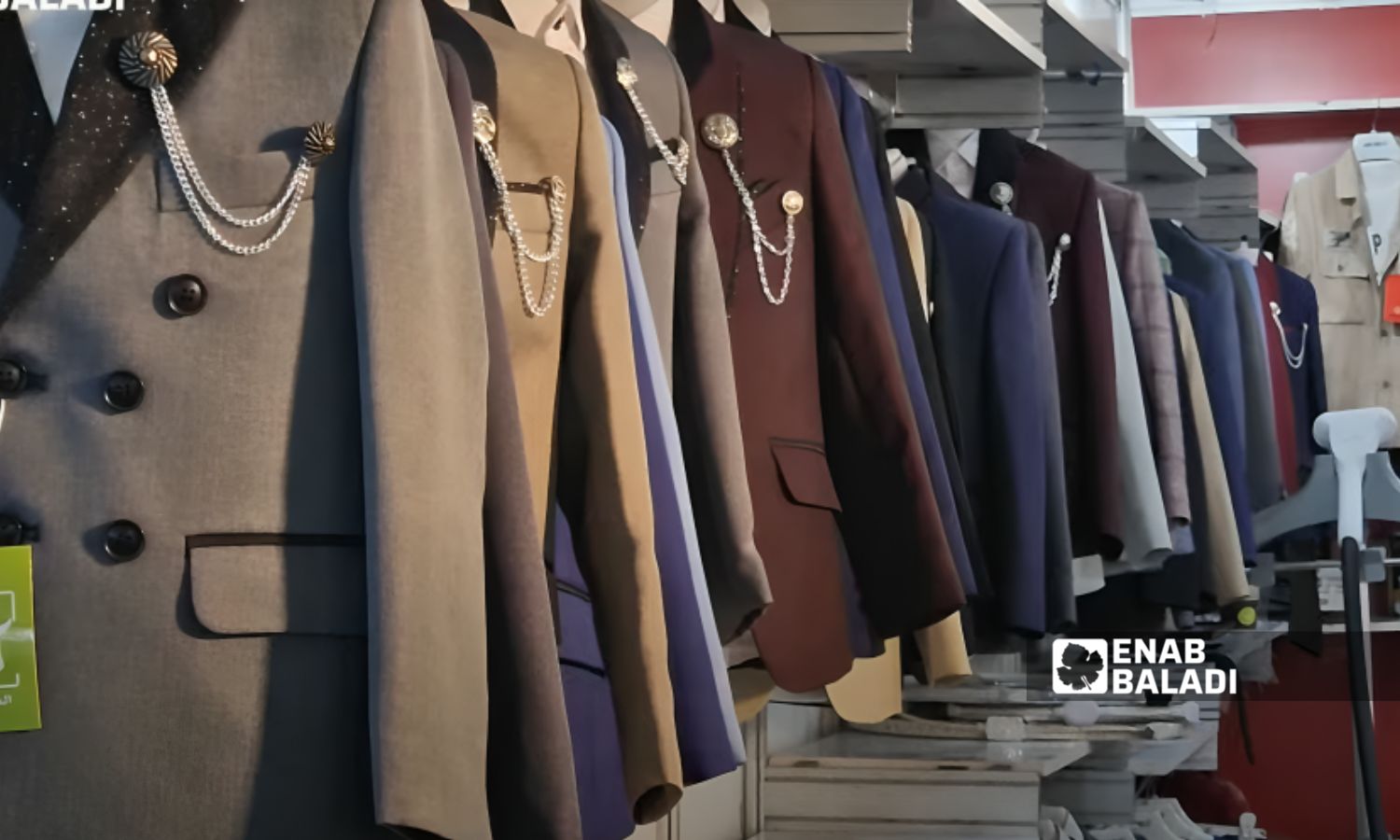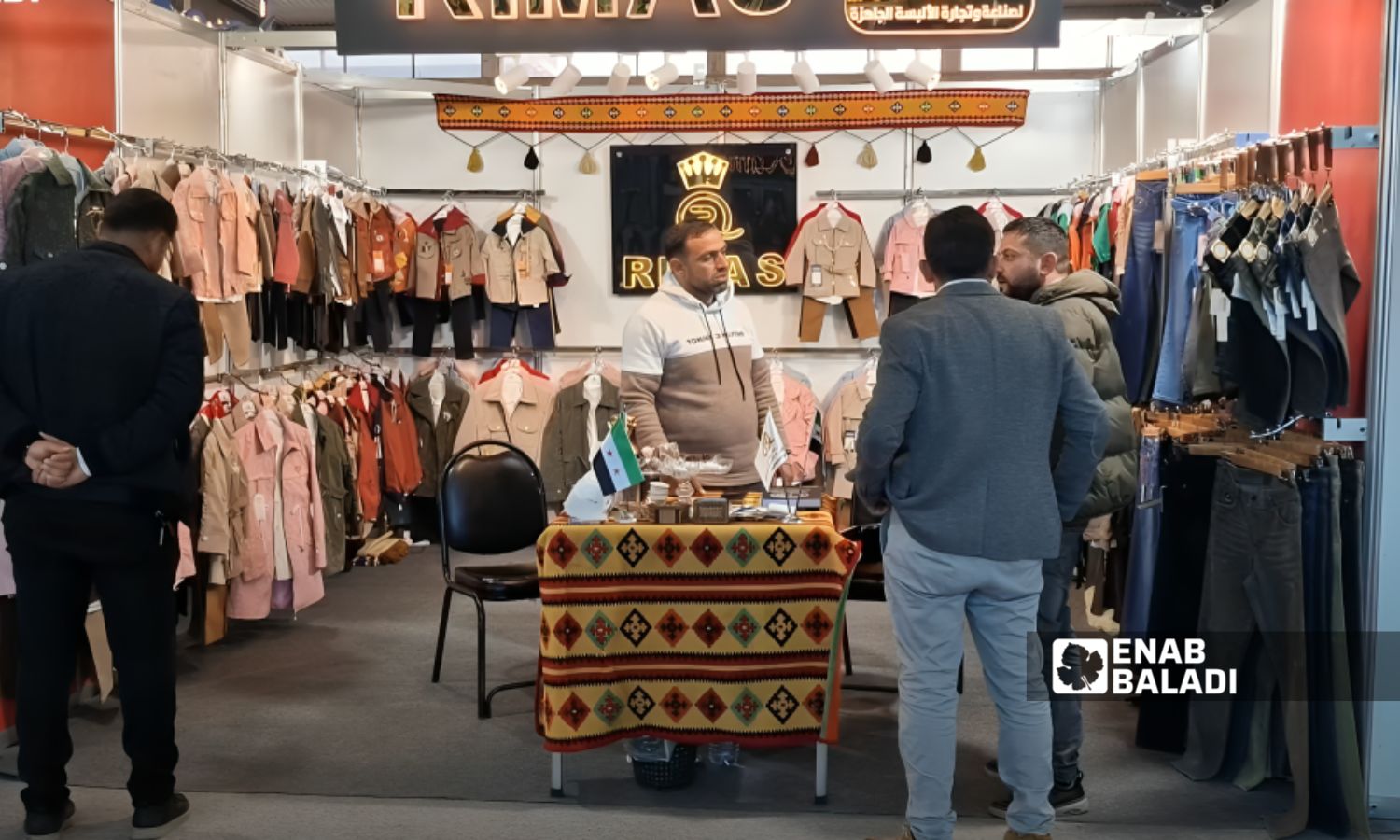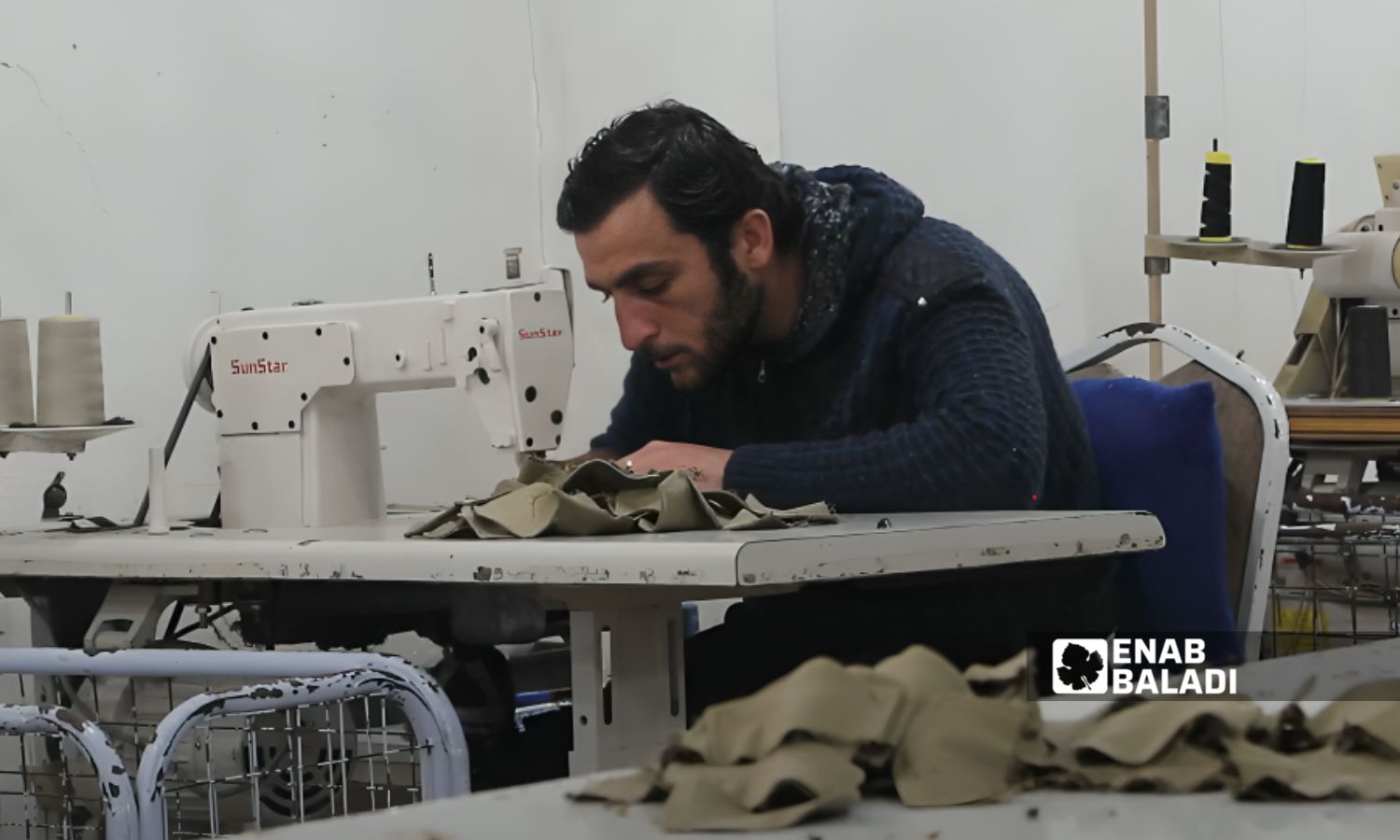



Syrian economic circles are trying to mitigate the decline of the textile sector, as the number of workshops closing down increases due to several internal and external factors.
On February 6, the activities of the Khan al-Harir fair, which specializes in textile industries such as shoes and clothing, commenced at the exhibition city in Damascus, in collaboration with the Damascus and Aleppo industrial chambers.

Clothes displayed in one of the pavilions of the Khan al-Harir specialized exhibition in Damascus – February 9, 2025 (Enab Baladi/Anas al-Khouli)
The exhibition coincided with the shutdown of several workshops specialized in textile production in Damascus and its suburbs, following the arrival of a large quantity of used clothing in the Syrian market and the skyrocketing prices of energy carriers (electricity, diesel, fuel) compared to neighboring countries.
Since the fall of the regime on December 8, 2024, three workshops in the textile sector ceased operations in the Karaj al-Nakheel area in Sahnaya, a suburb of Damascus, as reported by Abdul Karim Ali, owner of one of these workshops.
Sales of locally manufactured clothing have declined in favor of goods currently flooding the markets, which industrialist Adham Tabaa described as “low quality” or “surplus warehouse goods of poor quality.”
Industrialists face another issue concerning their finances, as they are unable to withdraw large sums from banks. However, there is money frozen with the accounts of the Golden Gate company, which used to monopolize fuel for industrialists during the previous regime.
Adham Tabaa, a member of the textile sector in the Damascus Chamber of Industry, explained to Enab Baladi that the most significant issue facing industrialists in the textile sector today is the high cost of energy carriers compared to neighboring countries. The price of one kilowatt of electricity in Syria has reached 27 cents.
In neighboring countries, the prices are as follows: Turkey 12 cents, Jordan 10 cents, Egypt 3 cents.
According to Tabaa, fuel is sourced from the refinery at $607 per ton, excluding transport costs, while the equivalent natural gas price in Egypt is $67 and in Turkey is $330.
After the fall of the regime, industrialists feel a sense of psychological relief and are willing to work for a year without profits or even at a loss, Tabaa noted, “but we are facing immense pressure because the markets have opened up to imports, and we can no longer operate our factories since energy costs are genuinely burdensome for industrialists.”
Tabaa stated that the Damascus Chamber of Industry has sent many letters to the ministry regarding this matter, but the response is always “the matter is under review.”
Enab Baladi contacted the Ministry of Industry regarding the energy carriers and the frozen funds of industrialists but received no response by the time this report was published.
Following the regime’s collapse, the streets of Damascus became flooded with stalls selling used clothes, known for their cheap prices compared to new clothing.
On January 11, the General Authority for Land and Maritime Ports in Syria announced the unification of fees on all customs deposits.
Mazen Alloush, Director of Relations at the General Authority for Land and Maritime Ports, stated that the unified customs fees consider protecting local products by encouraging industries through reduced tariffs on raw materials.
He added that the new tariffs reduced previously applied rates by 50 to 60%, which will have a direct impact on citizens across Syria.
According to Tabaa, the reduction in customs fees and the spread of used clothes have further burdened industrialists, especially in the textile sector, where a customs fee of four US dollars per kilogram of clothing was imposed, while industrialists demand it be raised to $12 in order to sell local products.
Tabaa noted that Turkish, Chinese, and European goods dominate the markets, while people refrain from buying local products due to their high prices, which he attributes primarily to the high production costs.
Tabaa believes that the spread of used clothing represents a “real threat to the textile industries.”
After the regime’s fall, Abdul Karim Ali closed his workshop in Sahnaya, specialized in weaving and textiles, due to a lack of market for selling clothes.
He announced through Facebook on January 28 that he was ready to sell the machines and equipment he possessed because work had completely stopped, especially as the cost of operations in terms of electricity and labor had become prohibitively high, he told Enab Baladi.
Ali added that the raw materials used to come from one of the factories in Damascus to be adjusted and tailored, then returned to the production facility for sale. His workshop received between 10,000 to 30,000 Syrian pounds per piece.
Today, however, the piece that was priced at 30,000 pounds is now being offered by the main factory owner at five thousand pounds, which represents a significant loss that Ali or any other workshop owner cannot sustain.

A worker in a sewing workshop in the countryside of Aleppo – April 6, 2020 (Enab Baladi/”What’s Your Problem?” program)
On January 23, the Central Bank of Syria issued a decision to freeze bank accounts linked to the former regime, including the account of the Golden Gate for oil services company.
This company, which belongs to the Qaterji International group, was previously monopolizing fuel delivery to industrial facilities.
Industrialists have demanded the release of their money trapped within the assets of this company, as it used to require upfront payments from its clients before supplying them with fuel.
Additionally, industrialists face difficulties in withdrawing money from banks, following the policy enacted by the Central Bank of Syria that restricts liquidity and provides minimal funds to clients and account holders.
The former governor of the Central Bank, Dureid Dergham, noted in a previous interview with Enab Baladi that the government should reconsider its liquidity restriction policy, as it leads to economic paralysis.
if you think the article contain wrong information or you have additional details Send Correction